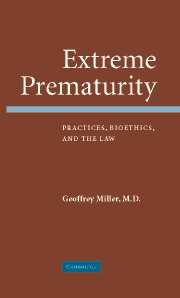Book contents
- Frontmatter
- Contents
- Part 1 THE EXTREMELY PRETERM INFANT: EPIDEMIOLOGY, PERCEPTIONS, AND PRACTICES
- Part 2 BIOETHICS
- 14 Moral Theory
- 15 Autonomy
- 16 Beneficence and Nonmaleficence
- 17 Justice
- 18 Sanctity of Life
- 19 Active and Passive Euthanasia
- 20 Personhood
- 21 Quality of Life and Best Interests
- 22 Futility
- Part 3 REPORTS, OFFICIAL OPINIONS, AND GUIDELINES
- Part 4 THE LAW
- Part 5 EPILOGUE: TRUTH, TRUST, AND BOUNDARIES
- References
- Index
14 - Moral Theory
Published online by Cambridge University Press: 23 September 2009
- Frontmatter
- Contents
- Part 1 THE EXTREMELY PRETERM INFANT: EPIDEMIOLOGY, PERCEPTIONS, AND PRACTICES
- Part 2 BIOETHICS
- 14 Moral Theory
- 15 Autonomy
- 16 Beneficence and Nonmaleficence
- 17 Justice
- 18 Sanctity of Life
- 19 Active and Passive Euthanasia
- 20 Personhood
- 21 Quality of Life and Best Interests
- 22 Futility
- Part 3 REPORTS, OFFICIAL OPINIONS, AND GUIDELINES
- Part 4 THE LAW
- Part 5 EPILOGUE: TRUTH, TRUST, AND BOUNDARIES
- References
- Index
Summary
Beauchamp defines the term morality as traditions of belief about right and wrong human conduct.(159) In particular this book is concerned with the morality of special groups, that is, health care professionals, those who care for children, and the state. Right and wrong conduct is conduct that affects the interests of others.(159) The theories that are used to argue what constitutes morality are ethics (although the term is also used as a synonym for morality), and the ethics that apply to a special group, such as health care professionals, are bioethics. The application of bioethics can be used when there are different choices concerning health care that affect the interests of individuals. Fundamental to what might be deemed the right choice is correct knowledge, which is the explanation for the first section that includes the epidemiology and prognosis of extreme prematurity, even though these topics may not always be “cut and dried.” However, central to the use of bioethics, or any argument, is that there are clear shared definitions. In addition, for a conclusion to be reached, and a course of action agreed on, boundaries should be delineated and common moral theories, codes, and principles adopted.(160) This does not mean that there always should be a universally adopted answer to any moral question or dilemma, but that any conclusion reached should have consistency and generalizable coherence.
- Type
- Chapter
- Information
- Extreme PrematurityPractices, Bioethics and the Law, pp. 51 - 58Publisher: Cambridge University PressPrint publication year: 2006



